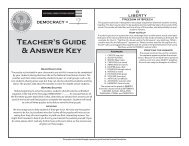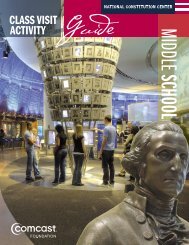Quote Match - American Spirits: The Rise and Fall of Prohibition ...
Quote Match - American Spirits: The Rise and Fall of Prohibition ...
Quote Match - American Spirits: The Rise and Fall of Prohibition ...
Create successful ePaper yourself
Turn your PDF publications into a flip-book with our unique Google optimized e-Paper software.
WHO SAID IT?<br />
QUOTE MATCH<br />
OVERVIEW<br />
<strong>The</strong> Founders believed citizens could best pursue happiness if<br />
government was limited to protecting the life, liberty, <strong>and</strong> property<br />
<strong>of</strong> individuals. <strong>The</strong>y believed that people were naturally flawed, <strong>and</strong><br />
government should be structured so that people's natural self-interest<br />
would lead <strong>of</strong>ficials to check one another's attempts to exercise<br />
more power than the Constitution allows. Unlike the Framers <strong>of</strong><br />
the Constitution, Progressives believed that man's nature can <strong>and</strong><br />
should be bettered by enlightened rulers. <strong>The</strong>refore, they believed,<br />
government should provide citizens with the environment <strong>and</strong><br />
the means to improve themselves through government-sponsored<br />
programs <strong>and</strong> policies <strong>and</strong> economic redistribution. Concepts such<br />
as natural rights did not matter as much as improving social order.<br />
<strong>The</strong>refore, the question for those in favor <strong>of</strong> <strong>Prohibition</strong> was not whether limiting the right to<br />
manufacture <strong>and</strong> sell alcohol infringed on anyone’s personal liberty, but whether a ban on alcohol<br />
would serve to improve the progress <strong>of</strong> mankind.<br />
related activities<br />
PROHIBITION<br />
PICTIONARY<br />
PROHIBITION ERA<br />
DINNER PARTY<br />
SMART BOARD<br />
ACTIVITY<br />
THE RISE & FALL OF<br />
PROHIBITION ESSAY<br />
Use your skills to get<br />
classmates to identify<br />
<strong>and</strong> define which<br />
<strong>Prohibition</strong> era term<br />
you draw.<br />
Learn about the roles<br />
<strong>of</strong> historical figures<br />
during the <strong>Prohibition</strong><br />
Era by taking on their<br />
identities for a dinner<br />
party.<br />
Learn about<br />
<strong>Prohibition</strong> through<br />
informational slides<br />
<strong>and</strong> activities using the<br />
SMART platform.<br />
Learn about the<br />
background <strong>of</strong> the<br />
18th Amendment,<br />
the players in the<br />
movement, <strong>and</strong> its<br />
eventual repeal.<br />
Made possible in part<br />
by a major grant from<br />
Developed in<br />
partnership with
TEACHER NOTES<br />
LEARNING GOALS<br />
Students will:<br />
• Examine quotations demonstrating<br />
the Founders’ view <strong>of</strong> the purpose <strong>of</strong><br />
government.<br />
• Examine quotations demonstrating the<br />
Progressives’ view <strong>of</strong> the purpose <strong>of</strong><br />
government.<br />
• Evaluate the differences between the<br />
Founders’ <strong>and</strong> Progressives’ views.<br />
HOMEWORK<br />
Have students find their own quotes from<br />
the Founding <strong>and</strong> Progressive eras to<br />
compare. <strong>The</strong>y can quiz other students or<br />
share with the class to sort into a list.<br />
ACTIVITY VARIATIONS<br />
• Copy quotes from the Founders <strong>and</strong> quotes<br />
from progressives on different colored<br />
paper. Once students have paraphrased <strong>and</strong><br />
understood all the quotations, have them place<br />
the cards on a timeline. Begin the timeline<br />
with the first quote, <strong>and</strong> extend it through the<br />
<strong>Prohibition</strong> era or beyond. Have students look<br />
for more modern quotations on the nature <strong>of</strong><br />
freedom <strong>and</strong> the purpose <strong>of</strong> government to fill<br />
in the later years to today.<br />
• Post a sign one side <strong>of</strong> the room that says<br />
“Founders” <strong>and</strong> on the other side one that<br />
says “Progressives.” Have students choose<br />
one card to paraphrase <strong>and</strong> analyze, <strong>and</strong> then<br />
st<strong>and</strong> closest to the sign they believe correctly<br />
describes the author <strong>of</strong> their quotation. Check<br />
answers <strong>and</strong> then debrief as a large group on<br />
the differences between the points <strong>of</strong> view in<br />
the quotations.<br />
• Have students chose one card each to<br />
paraphrase <strong>and</strong> analyze. <strong>The</strong>y should come<br />
to a decision individually as to whether<br />
the quotation comes from a Founder or a<br />
progressive. <strong>The</strong>n have students mingle<br />
with each other, sharing their quotations<br />
<strong>and</strong> taking on identities as “Founders” or<br />
“Progressives.” Founders should look for other<br />
Founders; progressives should look for other<br />
progressives. One all students have assembled<br />
into two large groups, check answers. Invite<br />
volunteers from each group to participate,<br />
one at a time, in a “fishbowl” discussion about<br />
their respective points <strong>of</strong> view. Allow several<br />
pairs the chance to discuss, <strong>and</strong> debrief as a<br />
large group.
WHO SAID IT?<br />
QUOTE MATCH<br />
ACTIVITY DIRECTIONS<br />
A. Before class, copy several sets <strong>of</strong> the quote cards on the Who Said It?<br />
<strong>Quote</strong> Sorting h<strong>and</strong>out.<br />
B. Put students in small groups, <strong>and</strong> give each group a complete set <strong>of</strong> quotes.<br />
Students should read <strong>and</strong> discuss the quotations.<br />
C. Have them paraphrase the ideas expressed on the lines below each quote.<br />
Clarify any questions as needed.<br />
D. Students should analyze each quotation to determine what views it<br />
expresses. To help in their analysis, they could ask:<br />
• What does this quotation seem to assume about human nature?<br />
• How does this quotation define the purpose <strong>of</strong> government?<br />
• What does this quotation express about the powers government<br />
should have?<br />
• How does this quotation characterize the proper relationship<br />
between the citizen <strong>and</strong> government?<br />
E. Have students sort the quotations into two stacks – one for Founders <strong>and</strong><br />
one for Progressives.<br />
F. As a class, read all the quotations aloud <strong>and</strong> have students share their<br />
answers. Discuss as needed to clarify underst<strong>and</strong>ing.<br />
G. Ask students to summarize what they observe in these quotations<br />
about the differences between the Founders’ philosophy on citizens <strong>and</strong><br />
government <strong>and</strong> the Progressives’ philosophy.<br />
H. Have students place cards on a timeline or create another visual<br />
representation <strong>of</strong> the quotations <strong>and</strong> how they show change over time.<br />
VARIATION: Depending on students’ reading level, break the set <strong>of</strong> quote cards<br />
into smaller groups <strong>and</strong> have students analyze a smaller number <strong>of</strong> the primary<br />
sources. Groups could then jigsaw <strong>and</strong> students could explain their quotations to<br />
their new group members.<br />
Developed in partnership with the Bill <strong>of</strong> Rights Institute<br />
NATIONAL CONSTITUTION CENTER
WHO SAID IT? QUOTE SORTING<br />
1<br />
“We<br />
hold these truths to be<br />
self-evident, that all men are<br />
created equal, that they are<br />
endowed by their Creator with<br />
certain unalienable Rights, that<br />
among these are Life, Liberty<br />
<strong>and</strong> the pursuit <strong>of</strong> Happiness.<br />
That to secure these rights,<br />
Governments are instituted<br />
among Men, deriving their just<br />
powers from the consent <strong>of</strong> the<br />
governed.”<br />
3<br />
“Can<br />
the liberties <strong>of</strong> a nation be<br />
sure when we remove their only<br />
firm basis, a conviction in the<br />
minds <strong>of</strong> the people, that these<br />
liberties are a gift from God?”<br />
______________________________<br />
______________________________<br />
______________________________<br />
______________________________<br />
______________________________<br />
______________________________<br />
______________________________<br />
______________________________<br />
2<br />
“’Personal<br />
liberty’ is at last<br />
an uncrowned, dethroned<br />
king, with no one to do him<br />
reverence. …We are no longer<br />
frightened by that ancient bogy-<br />
’paternalism in government.’<br />
We affirm boldly, it is the<br />
business <strong>of</strong> government to be<br />
just that—paternal. ..Nothing<br />
human can be foreign to a true<br />
government.”<br />
______________________________<br />
4<br />
“Better<br />
the occasional faults<br />
<strong>of</strong> a government that lives in<br />
a spirit <strong>of</strong> charity than the<br />
consistent omissions <strong>of</strong> a<br />
government frozen in the ice <strong>of</strong><br />
its own indifference.”<br />
______________________________<br />
______________________________<br />
______________________________<br />
______________________________<br />
______________________________<br />
______________________________<br />
______________________________<br />
Developed in partnership with the Bill <strong>of</strong> Rights Institute<br />
NATIONAL CONSTITUTION CENTER
5<br />
“Is<br />
life so dear, or peace so<br />
sweet, as to be purchased at the<br />
price <strong>of</strong> chains <strong>and</strong> slavery?<br />
Forbid it, Almighty God! I know<br />
not what course others may<br />
take; but as for me, give me<br />
liberty or give me death!”<br />
______________________________<br />
______________________________<br />
______________________________<br />
______________________________<br />
7<br />
“This<br />
is not a contest between<br />
persons. <strong>The</strong> humblest citizen<br />
in all the l<strong>and</strong>, when clad in the<br />
armor <strong>of</strong> a righteous cause, is<br />
stronger than all the hosts <strong>of</strong><br />
error.”<br />
______________________________<br />
______________________________<br />
______________________________<br />
______________________________<br />
6<br />
“[N]atural<br />
liberty is a gift <strong>of</strong> the<br />
beneficent Creator, to the whole<br />
human race; <strong>and</strong> … civil liberty<br />
is founded in that; <strong>and</strong> cannot<br />
be wrested from any people,<br />
without the most manifest<br />
violation <strong>of</strong> justice. Civil liberty<br />
is only natural liberty, modified<br />
<strong>and</strong> secured by the sanctions <strong>of</strong><br />
civil society.”<br />
______________________________<br />
8<br />
“In<br />
questions <strong>of</strong> power, then, let<br />
no more be heard <strong>of</strong> confidence<br />
in man, but bind him down<br />
from mischief by the chains <strong>of</strong><br />
the Constitution.”<br />
______________________________<br />
______________________________<br />
______________________________<br />
______________________________<br />
______________________________<br />
______________________________<br />
______________________________<br />
Developed in partnership with the Bill <strong>of</strong> Rights Institute<br />
NATIONAL CONSTITUTION CENTER
9<br />
“As<br />
a man is said to have a<br />
right to his property, he may be<br />
equally said to have a property<br />
in his rights. Where an excess<br />
<strong>of</strong> power prevails, property <strong>of</strong><br />
no sort is duly respected. No<br />
man is safe in his opinions,<br />
his person, his faculties, or his<br />
possessions.”<br />
______________________________<br />
______________________________<br />
11<br />
“Our country has deliberately<br />
undertaken a great social <strong>and</strong><br />
economic experiment, noble<br />
in motive <strong>and</strong> far-reaching in<br />
purpose."<br />
______________________________<br />
______________________________<br />
______________________________<br />
______________________________<br />
______________________________<br />
______________________________<br />
10<br />
“For it is very clear that in<br />
fundamental theory socialism<br />
<strong>and</strong> democracy are almost if<br />
not quite one <strong>and</strong> the same.<br />
<strong>The</strong>y both rest at bottom<br />
upon the absolute right <strong>of</strong> the<br />
community to determine its<br />
own destiny <strong>and</strong> that <strong>of</strong> its<br />
members. Men as communities<br />
are supreme over men as<br />
individuals.”<br />
______________________________<br />
______________________________<br />
______________________________<br />
______________________________<br />
12<br />
“<strong>The</strong> doctrine <strong>of</strong> ‘personal<br />
liberty’ as applied to the use <strong>of</strong><br />
liquor has been over-worked by<br />
the liquor men. As a matter <strong>of</strong><br />
fact, there is no such thing as an<br />
absolute individual right to do<br />
any particular thing, or to eat or<br />
drink any particular thing, or to<br />
enjoy the association <strong>of</strong> one's<br />
own family, or even to live, if<br />
that thing is in conflict with ‘the<br />
law <strong>of</strong> public necessity.’”<br />
______________________________<br />
______________________________<br />
______________________________<br />
______________________________<br />
Developed in partnership with the Bill <strong>of</strong> Rights Institute<br />
NATIONAL CONSTITUTION CENTER
WHO SAID IT? QUOTE MATCH<br />
ANSWER KEY<br />
1. Founder – <strong>The</strong> Declaration <strong>of</strong> Independence, 1776<br />
2. Progressive – Reverends Josiah Strong <strong>and</strong> W.D.P. Bliss, <strong>The</strong> Gospel <strong>of</strong> the<br />
Kingdom magazine editors, 1914<br />
3. Founder – Thomas Jefferson, Notes on the State <strong>of</strong> Virginia, 1785<br />
4. Progressive – Franklin D. Roosevelt, Speech to the Democratic National<br />
Convention, 1936<br />
5. Founder - Patrick Henry, Speech to the Second Virginia Convention, 1775<br />
6. Founder – Alex<strong>and</strong>er Hamilton, <strong>The</strong> Farmer Refuted, 1775<br />
7. Progressive - Williams Jennings Bryan, Cross <strong>of</strong> Gold Speech at the<br />
Democratic National Convention, 1896<br />
8. Founder - Thomas Jefferson, Resolutions Relative to the Alien <strong>and</strong> Sedition<br />
Acts, 1798<br />
9. Founder – James Madison, <strong>The</strong> National Gazette, 1792<br />
10. Progressive - Woodrow Wilson, “Socialism <strong>and</strong> Democracy, ” 1887<br />
11. Progressive – Herbert Hoover, Letter on the Passage <strong>of</strong> the 18th Amendment to<br />
an Idaho Senator, 1928<br />
12. Progressive – Charles Stelze, Why <strong>Prohibition</strong>!, 1918<br />
Developed in partnership with the Bill <strong>of</strong> Rights Institute<br />
NATIONAL CONSTITUTION CENTER


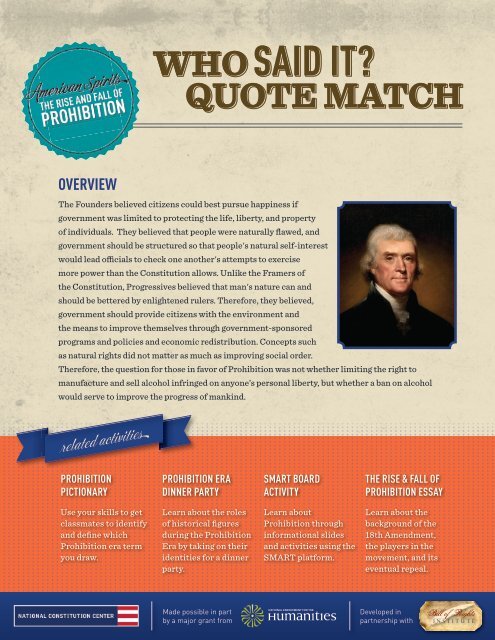
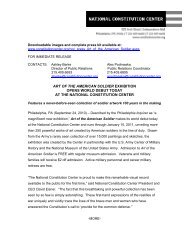
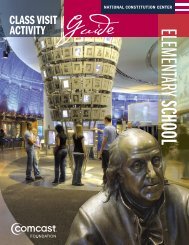
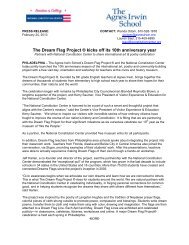
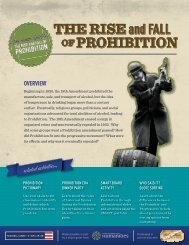

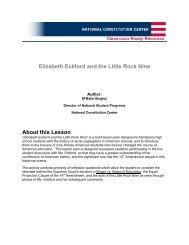
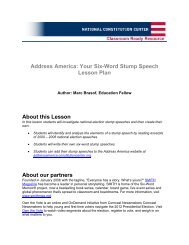
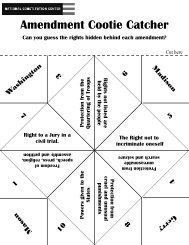
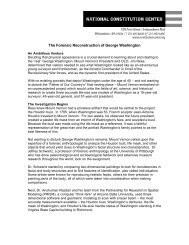
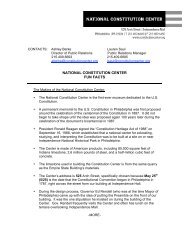
![Preamble Scramble [PDF] - National Constitution Center](https://img.yumpu.com/33840276/1/190x245/preamble-scramble-pdf-national-constitution-center.jpg?quality=85)
